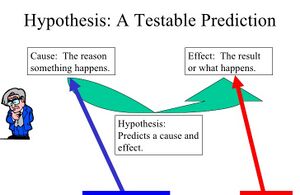Difference between revisions of "Hypothesis"
| (3 intermediate revisions by the same user not shown) | |||
| Line 1: | Line 1: | ||
| − | == | + | [[File:HypothesisFlowchart.jpg|thumb|right|Scientific Hypothesis Flowchart]] |
| + | ==Definitions== | ||
| Line 5: | Line 6: | ||
1. ''noun'' | 1. ''noun'' | ||
| − | a: an assumption or concession made for the sake of argument<ref name="hypothesis" /> | + | a: an [[assumption]] or concession made for the sake of argument<ref name="hypothesis" /> |
| − | b: an interpretation of a practical situation or condition taken as the ground for action<ref name="hypothesis">https://www.merriam-webster.com/dictionary/hypothesis</ref> | + | b: an [[interpretation]] of a practical situation or condition taken as the ground for action<ref name="hypothesis">https://www.merriam-webster.com/dictionary/hypothesis</ref> |
| Line 14: | Line 15: | ||
1. ''noun'' | 1. ''noun'' | ||
| − | a. A predictive statement which relates to a [[dependent variable]] and an [[independent variable]]<ref>Marczyk, Geoffrey: Essentials Of Research Design And Methodology https://archive.org/details/7.essentialsOfResearchDesignAndMethodology2005LingLotb</ref> | + | a. A [[predictive]] statement which relates to a [[dependent variable]] and an [[independent variable]]<ref>Marczyk, Geoffrey: Essentials Of Research Design And Methodology https://archive.org/details/7.essentialsOfResearchDesignAndMethodology2005LingLotb</ref> |
| − | == | + | ==Hypothesis in Context== |
| + | <br> | ||
| + | "Once the hypothesis has been established, it is time to test it. The process of experimentation is what sets science apart from other disciplines, and it leads to discoveries every day. An experiment is designed to prove or disprove the hypothesis. If your prediction is correct, you will not be able to reject the hypothesis. | ||
| + | ''The Nature of Science and The Scientific Method''<ref>McLelland, Christine V: The Nature of Science and The Scientific Method; The Geological Society of America | ||
| + | https://www.geosociety.org/documents/gsa/geoteachers/NatureScience.pdf</ref> | ||
| + | |||
| + | "The scientific method requires that a hypothesis be ruled out or modified if its predictions are clearly and repeatedly incompatible with experimental tests." | ||
| + | |||
| + | ''Introduction to the Scientific Method, University of Rochester Physics Lab''<ref>Introduction to the Scientific Method, University of Rochester Physics Lab; http://teacher.pas.rochester.edu/phy_labs/AppendixE/AppendixE.html</ref> | ||
| + | |||
| + | |||
| + | "Hypotheses link variables, in causal assertions...Hypotheses should be falsifiable." | ||
| + | |||
| + | ''Florida State University, METHODS OF EDUCATIONAL RESEARCH:VARIABLES AND HYPOTHESES''<ref>Florida State University, GUIDE 2 - METHODS OF EDUCATIONAL RESEARCH:VARIABLES AND HYPOTHESES; | ||
| + | http://myweb.fsu.edu/slosh/MethodsGuide2.html</ref> | ||
==References== | ==References== | ||
Latest revision as of 18:39, 9 April 2020
Definitions
colloquial
1. noun
a: an assumption or concession made for the sake of argument[1] b: an interpretation of a practical situation or condition taken as the ground for action[1]
scientific
1. noun
a. A predictive statement which relates to a dependent variable and an independent variable[2]
Hypothesis in Context
"Once the hypothesis has been established, it is time to test it. The process of experimentation is what sets science apart from other disciplines, and it leads to discoveries every day. An experiment is designed to prove or disprove the hypothesis. If your prediction is correct, you will not be able to reject the hypothesis.
The Nature of Science and The Scientific Method[3]
"The scientific method requires that a hypothesis be ruled out or modified if its predictions are clearly and repeatedly incompatible with experimental tests."
Introduction to the Scientific Method, University of Rochester Physics Lab[4]
"Hypotheses link variables, in causal assertions...Hypotheses should be falsifiable."
Florida State University, METHODS OF EDUCATIONAL RESEARCH:VARIABLES AND HYPOTHESES[5]
References
- ↑ 1.0 1.1 https://www.merriam-webster.com/dictionary/hypothesis
- ↑ Marczyk, Geoffrey: Essentials Of Research Design And Methodology https://archive.org/details/7.essentialsOfResearchDesignAndMethodology2005LingLotb
- ↑ McLelland, Christine V: The Nature of Science and The Scientific Method; The Geological Society of America https://www.geosociety.org/documents/gsa/geoteachers/NatureScience.pdf
- ↑ Introduction to the Scientific Method, University of Rochester Physics Lab; http://teacher.pas.rochester.edu/phy_labs/AppendixE/AppendixE.html
- ↑ Florida State University, GUIDE 2 - METHODS OF EDUCATIONAL RESEARCH:VARIABLES AND HYPOTHESES; http://myweb.fsu.edu/slosh/MethodsGuide2.html


